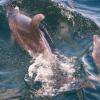Exploring fishers' perceptions of index insurance and coral reef health in the context of climate-driven changes in extreme events (2022)
As climate change increasingly affects fisheries globally, the need is growing to support fishers in their responses and adaptation to its impacts (Barange et al., 2018). Changes in storminess—both changes in adverse weather conditions (e.g. wave height, heavy rainfall, and wind) and extreme events (e.g. tropical cyclones, storm surges, and flooding)—are projected under future climate change (Sainsbury et al., 2018; Collins et al., 2019).
Fishers can be significantly affected by such events, incurring damage to their boats, gear, and equipment and wider harbor facilities, facing disruption to getting out to sea and catching fish, with often profound implications for livelihoods (Sainsbury et al., 2018; Turner et al., 2020). Further, given many fishers reside in coastal areas, they can also incur damages to their property and other assets (Cashman and Nagdee, 2017; Turner et al., 2020). Fishers in tropical Small Island Developing States (SIDS) are particularly vulnerable to extreme events.
This is due to their often-high reliance on fishing and coastal ecosystems such as coral reefs, for incomes and food security, and changes in storminess are expected to severely impact these areas in coming decades (Mumby et al., 2014; Cashman and Nagdee, 2017; Stephenson and Jones, 2017; Turner et al., 2020).
Area of interest: Grenada
Year: 2022




